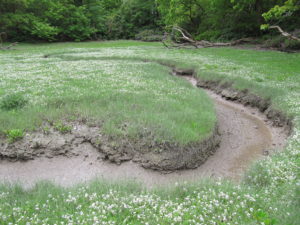Client: Environmental Protection Agency
Project summary
This project is a 36-month multi-disciplinary collaboration between Botanical, Environmental and Conservation (BEC) Consultants Ltd. and the Department of Botany, Trinity College Dublin (TCD). Through field survey, collation of existing data, modelling and analysis, the project will link anthropogenic pressures to changes in saltmarsh communities and investigate the ecosystems services and ecological functions of saltmarshes in Ireland. By integrating the outputs of this research, it will refine the tool developed by the recent SMAATIE (Saltmarsh Angiosperm Assessment Tool for Ireland) project for the purposes of the Water Framework Directive. The tool, which assesses ecological status for part of the angiosperm Biological Quality Element in coastal and transitional waters, will be tested in the field and applied to a selection of water bodies.
Work packages
The project comprises three work packages (WPs). There is synergy between WP1 and WP2, with outputs from both feeding into WP3.
Work Package 1: Anthropogenic pressures on Irish saltmarshes
Work Package 2: Ecosystem services and ecological function of Irish saltmarshes
Work Package 3: Refinement and testing of SMAATIE
Expected outputs
The SAMFHIRES project outputs will include a fully detailed final report, a non-technical synthesis report and a revised Practitioner’s Manual reflecting the revised assessment tool. Other project outputs will include final metric and Ecological Quality Ratio (EQR) data for all assessed water bodies in Microsoft Excel format, vegetation quadrat data in Turboveg format and GIS data in ESRI format defining Potential Saltmarsh Area. At least two oral conference presentations will be made and three to four papers will be published in peer-reviewed journals. TCD will hold two seminars where progress on the project will be presented and feedback can be received. Newsletters will be produced and disseminated in PDF format to allow people to follow developments on the project.
Newsletter
Download the project newsletters here:
SAMFHIRES newsletter Issue 1 (December 2016)
SAMFHIRES newsletter Issue 2 (September 2017)
SAMFHIRES newsletter Issue 3 (March 2018)
